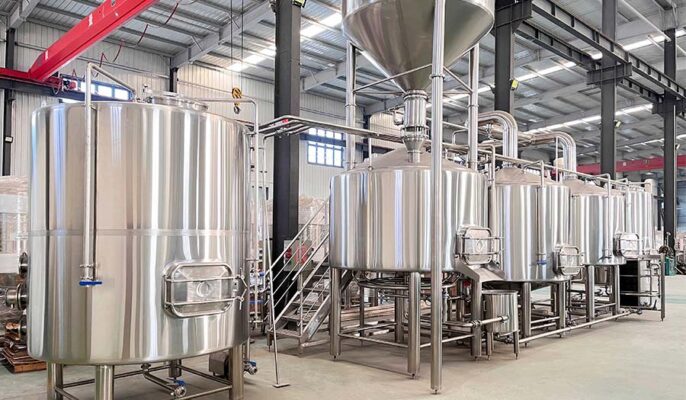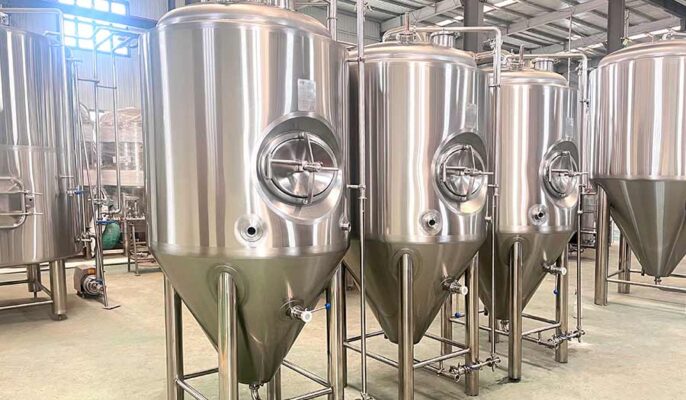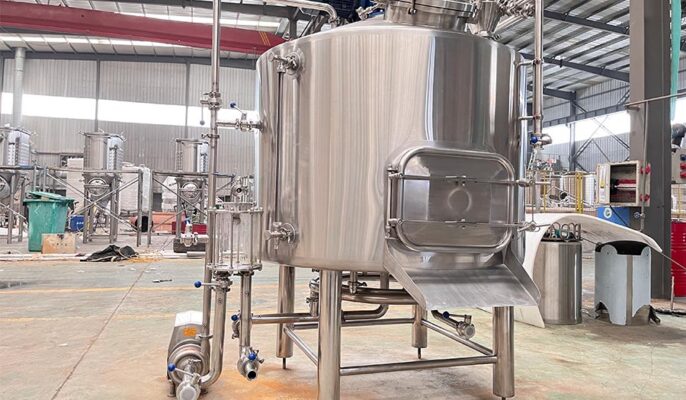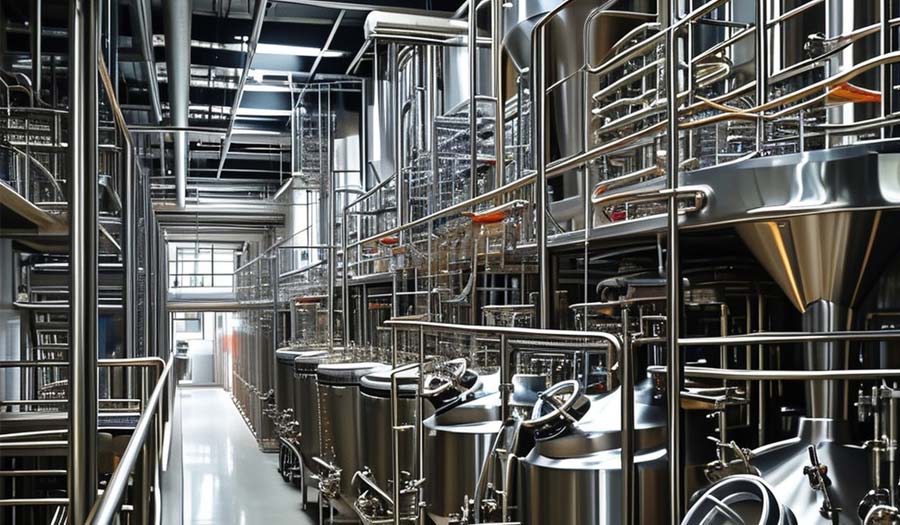Starting a brewery? Awesome! But finding the right folks to make your commercial brewing equipment can be tricky. Pick the wrong company, and you might get gear that breaks down, makes wonky beer, or stops your dream brewery from growing. The fix? Team up with makers who know their stuff, build high-quality gear, and really want you to succeed.
So, who are the best commercial brewing equipment manufacturers? They’re the ones with lots of experience, smart engineers, and who use top-notch stuff like great stainless steel. They should let you customize your gear, help you set it up, and stick around to help later. Think of them as partners who build reliable brewing solutions made just for you, helping your brewery make amazing craft beer smoothly and for a long time.
What Makes Commercial Brewing Gear Really Good?
Good commercial brewing equipment is more than just shiny metal. Here’s what really counts:
-
Awesome Metal: The best gear uses special stainless steel (usually types 304 or 316). Why?
-
It’s super strong.
-
It doesn’t rust easily.
-
It cleans up fast.
-
It won’t make your beer taste funny.
Cheaper metal can get tiny holes, rust, or mess up your brew. No good!
-
-
Super Smooth Welds: Look at where the metal pieces are joined (the welds). They need to be perfectly smooth, especially inside the tanks. Rough spots can hide germs, making tanks hard to clean and maybe spoiling your beer. Good welds (called TIG welds) are key!
-
Quality Little Parts: It’s not just the big tanks! Every valve, pump, seal, and connection matters. Good makers use parts that last and are easy to find if you need a replacement. Paying attention to detail here saves headaches later. Think about even the steam pipes – quality matters everywhere!
-
Smart Design: How the gear is designed makes a huge difference in how easy it is to use and how well it works. This means:
-
Tanks shaped right for even heating and mixing.
-
Pipes laid out logically.
-
Safe ways to get inside or reach things.
-
Easy ways to clean everything (called CIP or Clean-in-Place).
Good engineers think like a brewer and plan for what you’ll need on brew day.
-
Here at our place, we put a ton of pride and craftsmanship into every tank and system we build. Our team knows brewing inside and out. They make sure the equipment designed isn’t just okay – it’s built for top performance and simplicity. We believe strong building and caring about the small stuff are super important.
How Big Should My Brewery System Be (How Many BBLs)?
Picking the right size for your main brewing setup (your brewhouse) is a big decision! We measure size in “barrels” (bbl). It depends on your plans: how much beer you want to sell, who you’re selling to, and how much you hope to grow.
-
Too Small? You’ll be brewing constantly and might not keep up with orders. Bummer!
-
Too Big? You spend too much money upfront on gear you’re not using fully. That can hurt your cash flow.
Think about these things:
-
Sales Goals: How much beer do you really think you’ll sell in the first few years? (Be honest!) Think about sales in your taproom and sales to stores/bars.
-
Brewing Days: How often do you want to brew? You could make the same amount of beer with a smaller system brewed often, or a bigger one brewed less often. This changes your costs for things like electricity and paying your team.
-
Tank Space: Your brewhouse needs backup! You need enough fermenter tanks to hold the beer while it bubbles away. A good rule of thumb? Have 2 or 3 times your brewhouse volume in fermenter space. So, a 10 bbl brewhouse might need a few 10 bbl or 20 bbl fermenters. This lets you make different kinds of beer that take different amounts of time.
-
Growing Later: Can you add more tanks later if you need to? Is your building big enough? Sometimes getting a slightly bigger mash tun (where you mix grains and water) or kettle (where you boil) now makes it easier to grow later.
-
Beer Styles: Making lagers? They take longer in the tank than ales. Plan your tank space based on the types of beer you want to brew.
We love helping folks figure this out! We look at your business plan and help find the perfect system size. Whether it’s a little beer equipment for sale to test recipes or a big 30 bbl system to sell beer far and wide, we help find that “just right” spot between cost now and making lots of beer later.
2, 3, or 4 Tanks in the Brewhouse: Which is Right for Me?
Your brewhouse is where the magic starts! How many main tanks (we call them vessels) it has changes how you brew and how fast you can make beer. Let’s break it down:
| Vessel System | Typical Tanks | Good For | Not So Good For | Example Link |
| 2-Vessel | Mash/Lauter Tun + Kettle/Whirlpool | Smaller breweries, brewpubs, saving space & money upfront. | Making lots of batches quickly; less flexibility. | 10BBL 2 Vessel Microbrewery Equipment |
| 3-Vessel | Mash Tun + Lauter Tun + Kettle/Whirlpool OR Mash/Lauter Tun + Kettle + Whirlpool | Growing breweries, better speed than 2-vessel, good balance. | Less speed than 4-vessel. | 1500L 3 Vessel Brewery Equipment |
| 4-Vessel | Mash Tun + Lauter Tun + Kettle + Whirlpool | High-volume breweries, making beer non-stop, lots of control. | Higher cost, needs more space. | 20HL 4 Vessels Commercial Brewery Equipment |
| 5+ Vessel | Adds special cookers or extra whirlpools. | Huge breweries, very specific needs. | Most breweries don’t need this complexity or cost. | 30HL 5 Vessels Commercial Brewery Equipment |
“Which setup is ‘best’? It really depends on YOU!” Your production goals, how long you want your brew day to be, how much room you have, your budget, and your team size all matter. We build all these kinds of brewhouses and help breweries pick the smartest, most efficient solution for their specific situation.
Why is Stainless Steel the Best Stuff for Brewery Tanks?
Stainless steel (you’ll hear numbers like 304 or 316) is the rockstar metal for brewery tanks. Think fermenters, brite tanks (where beer gets carbonated), hot/cold water (liquor) tanks, and the main brewhouse tanks. Here’s why everyone loves it:
-
Super Tough: It lasts for ages and doesn’t dent easily. Your tanks will be around for a long, long time.
-
No Rust: It has a natural shield that stops rust, even with acidic beer and cleaning stuff.
-
Easy Peasy Cleaning: The surface is smooth like glass. Germs can’t hide easily, so cleaning is faster and keeps your beer safe from yucky flavors. This is SO important!
-
Doesn’t Change Taste: Stainless steel doesn’t mess with your beer’s flavor. What you brew is what you taste!
-
Handles Heat & Cold: It works great with heating and cooling systems (like special jackets that use steam and glycol) to keep your beer at the perfect temperature.
Sure, some folks use wood barrels for aging, but for the main work of brewing and fermenting, stainless steel is king. It gives you the best mix of clean, strong, and flavor-safe. We only use top-quality stainless steel from trusted places to build our craft brewery equipment. Quality first, always!

Can I Get Brewing Gear Made Just for My Brewery?
Yes, you totally can! And you probably should think about it. A great brewing equipment manufacturer doesn’t just sell off-the-shelf stuff. They make custom gear too. Why? Because every brewery is different!
-
Maybe your building has low ceilings or weird corners.
-
Maybe you have a special way you like to brew.
-
Maybe you want fancy computer controls (or maybe you like keeping it simple!).
-
Maybe you want your tanks to look a certain way.
Custom options could include:
-
Tank Shapes: Making tanks taller, shorter, wider, or skinnier to fit your space.
-
Port Locations: Putting doors, valves, and sensors right where you want them for easy use.
-
Heating Choices: Letting you pick how to heat things up – steam, direct fire (like a giant gas stove), or electric heating. We can even help connect it to your boiler.
-
Control Levels: Building anything from simple manual controls to a fully automated brewing system you can run from a screen.
-
Looks: Giving you choices for how the outside of the tanks look (like brushed metal or shiny polish).
-
Putting It All Together: Making sure the brewhouse, fermenters, brite tanks, grain equipment, and even keg washers all work together perfectly.
We love custom projects! Our engineer team sits down with you, listens to your ideas, and figures out how to build the perfect brewing system for you. Need to tweak a quality beer equipment Brewing System for a tight spot? Want a unique brewhouse design? Customization is how we deliver brewing solutions that really work for our clients.
What Should I Look For in Fermenter and Brite Tank Designs?
Fermenters are where your wort (sugary liquid) turns into beer. Brite tanks are often where it gets carbonated and ready to serve. Good design here is key for awesome beer! Look for these features:
-
Cone Bottom (Fermenters): A cone shape at the bottom helps yeast settle so you can collect it or get the clear beer off easily. The angle matters! (Usually 60-75 degrees).
-
Cooling Jackets: Special dimpled metal sections on the outside of the tank. Cold liquid (glycol) runs through them to control the temperature perfectly during fermentation. This is super important for taste!
-
Pressure Rating: Tanks need to be strong enough to handle the pressure from fizzy beer, especially brite tanks. Look for an official rating (like ASME).
-
Easy-Clean Connections: All valves and openings should use “sanitary tri-clamp” fittings. They come apart easily for cleaning – no threads where gunk can hide!
-
Built-in Cleaning (CIP): A spray ball inside the tank connected to pipes makes cleaning way easier and more thorough. Saves you from scrubbing!
-
Access Doors (Manways): Doors (on top or side) need to be big enough to see inside or reach in if needed. “Shadowless” designs are best because they’re easier to clean.
-
Sample Valve: A little tap to let you take small samples to check how the beer is doing without letting air in.
-
Racking Arm: A bent pipe inside that lets you drain the clear beer out, leaving the settled yeast behind. Ones that rotate are handy.
-
Carbonation Stone (Brite Tank): A special stone in the brite tank (or sometimes a unitank – a tank that does both fermenting and carbonating) that makes tiny bubbles of CO2 dissolve into the beer to make it fizzy.
How well these tanks are designed and built directly affects your final beer. We make sure our Stainless Steel Fermentation Tank & Bright Tanks have all these smart features. We focus on making them efficient, user-friendly, and super sanitary.

What Other Gear Do I Need Besides the Big Tanks?
Making great beer takes more than just the main brewhouse tanks and fermenters. You’ll need some trusty sidekick equipment too:
-
Hot & Cold Water Tanks (HLT & CLT): Tanks to hold hot water (for mashing and cleaning) and cold water (often used with heat exchangers to cool the wort). Having the right size tanks makes your brew day run smoother.
-
Pumps: You need special food-grade pumps to move liquids (wort, beer, water, cleaning stuff) around the brewery. Pumps with adjustable speeds give you more control.
-
Wort Chiller (Heat Exchanger): This cools down the hot, sugary wort super fast before it goes into the fermenter. Quick cooling is important for healthy fermentation. Usually looks like a stack of metal plates.
-
Grain Gear:
-
A grain mill to crack the malt just right.
-
Augers (like big screws) or conveyors to move the crushed grain (grist) to the mash tun.
-
Maybe big silos if you buy grain in bulk.
-
A plan for getting rid of the used, spent grain.
-
-
Keg Cleaner & Filler: If you sell beer in kegs, you absolutely need good keg washers to clean and sanitize them properly before filling.
-
Cleaning Cart (CIP Skid): Often a portable cart with pumps and small tanks to hold cleaning chemicals. Makes cleaning multiple tanks and pipes easier.
-
Filter (Maybe): Some breweries filter their beer to make it crystal clear. Many craft beer styles skip this step. It’s optional!
-
The Basics (Utilities): You can’t brew without these!
-
A reliable steam source (like a boiler) for heating.
-
A glycol chiller system to provide the cold liquid for tank jackets.
-
Compressed air for some equipment.
-
Good, clean water (maybe water treatment).
-
Putting all this together smartly is part of good brewery design. As a supplier who offers the whole package, we help you pick out all the gear you need and make sure it works together as a complete turnkey solution.
Why is Having an Engineer So Important for Brewery Gear?
Having smart engineers involved when designing and building brewery equipment is a really big deal. Here’s why they’re key players:
-
Making Things Work Better: Engineers know how liquids flow, how heat moves, and the science behind brewing. They use this know-how to design tanks and systems that work efficiently. They figure out the best shapes, how much heating or cooling you need, and make sure everything mixes well in the mash tun and kettle.
-
Making Sure It’s Strong & Safe: They calculate how strong tanks need to be to handle pressure and heat safely. They follow safety rules and build in features to protect you and your team. This is super important!
-
Picking the Right Stuff: Engineers choose the best type of stainless steel and other materials for each job, making sure they won’t corrode or cause problems.
-
Custom Designs & Fit: Got a tricky space or a unique brewing idea? Engineers turn your needs into detailed plans (like blueprints) and make sure all the pieces – brewhouse, fermenters, pipes, controls – fit and work together perfectly.
-
Adding Automation: Want computer controls? Electrical and software engineers design those systems. They make sure temperatures are spot-on, valves open and close at the right time, and you can track your brew.
-
Checking Quality: Engineers watch over the building process. They check that the plans are followed, the welds are good, and everything passes tests before it leaves the factory and gets set up (installation).
Our team of skilled engineers works right alongside our customers, from the first idea until the brewery is up and running. They mix technical skill with real-world brewing knowledge to create brewing systems that are tough, efficient, easy to use, and top quality. That engineering muscle is why we can fabricate commercial brewing equipment you can count on.
Want to Make More Than Beer? Gear for Spirits and Kombucha!
The craft drink world is buzzing! Maybe you’re thinking about making spirits (like whiskey or gin) or brewing tangy kombucha alongside your beer. Good news: some of your brewing knowledge and maybe even some space can be used! But you will need some special gear.
-
Making Spirits (Distilling): You might use your brewery’s mash tun to make the sugary base liquid (called wash). But then you need a still. A still is special equipment designed to heat the wash, turn the alcohol into vapor, and then cool it back into strong liquid spirit. Stills often use copper (it helps remove some harsh flavors) and need extra safety steps because you’re dealing with flammable stuff. We make High-Quality Distillery Equipment ready for your spirit-making adventures.
-
Brewing Kombucha: Kombucha also ferments in tanks, similar to beer. You’ll need good stainless steel tanks because kombucha is quite acidic. Temperature control during fermentation is also key. While you might not need high-pressure tanks unless you force carbonate it, the basic needs are similar. We build special Kombucha Fermentation Tank setups just for this fizzy tea.
Thinking about adding spirits or kombucha? It’s smart to work with an equipment manufacturer who knows about these drinks too. We can help design safe, efficient systems for distilling or kombucha production, maybe even fitting them in neatly with your current brewery setup.

What Turns a Brewtech Supplier into a Real Partner?
Picking a brewtech supplier isn’t like buying a toaster. You’re choosing someone to build the heart of your business! A real partner does more than just sell you tanks. They actually help you succeed. Here’s what to look for:
-
They Listen First: They want to understand your dream, your budget, your building, and how you want to brew before they suggest any gear. They ask good questions.
-
Help with the Plans: They give you clear drawings and layout ideas to make sure the system fits and works well in your space.
-
Talk Straight: They keep you in the loop while your gear is being designed and built. They answer your calls and emails!
-
Build Great Stuff: You can see they care about quality – good metal, great welds, paying attention to detail. It’s equipment designed and built with pride.
-
Help Setting Up: They offer expert help (maybe even send an engineer) when the gear arrives to make sure installation goes right and your first brews are smooth. This install help is huge!
-
Teach Your Team: They show your crew how to use and take care of the new brewing equipment.
-
There for You Later: Got a question months later? Need a spare part? A real partner offers great customer service and tech support long after the sale. Check if they stock common Brewery Parts.
-
Know the Biz: They understand the brewing industry – what’s new, what challenges brewers face, and how to make great beer.
Our goal isn’t just to be a manufacturer. We want to be your trusted partner. Your success is our success. We build relationships by offering solid support, reliable quality brewing equipment, and sharing your passion for amazing craft beer. From dreaming it up to brewing it up, we’re here for you.
FAQs
How long does it usually take to get commercial brewing equipment after ordering?
It really depends! Things like how busy the manufacturer is, how big or complicated your system is, and if you need lots of custom stuff all affect timing. Plan for maybe 3 to 9 months from when you finalize the design until it arrives. Build this wait time into your plans!
Is getting help with installation from the manufacturer a big deal?
Yes, it can be super helpful, especially for bigger systems. Some breweries do it themselves or hire local help, but having the maker guide the installation helps make sure everything is put together right, hooked up correctly (like steam and glycol lines), and works properly from the start. On-site help during the first brews (commissioning) can save you headaches and money.
What kind of warranty comes with brewing equipment?
Good manufacturers usually give a warranty that covers problems with the materials or how it was built (craftsmanship). This often lasts 1 to 5 years for big tanks. Smaller things like seals or electronics might have shorter warranties. Always ask for the warranty details in writing before you buy!
Can you help me figure out the best layout for my brewery space?
Yep! Good brewing equipment manufacturers often help with brewery design and layout. Our engineers use computer programs to plan where everything should go in your building. This helps make sure your workflow is smooth, it’s safe, utilities connect easily, and there’s maybe even room to grow later.
Do you guys offer payment plans for brewery equipment?
We don’t directly lend money, but we know companies that do! We often work with banks and lenders who specialize in helping breweries finance their gear. We can give you all the paperwork and details they’ll need for your loan application.
How does giant brewing equipment actually get shipped to my brewery?
We handle all the shipping details! We carefully wrap and secure all the tanks and parts, find the right trucking companies or ships (if needed), deal with any paperwork for shipping across borders, and make sure it all gets to your brewery safely and on time.
Quick Cheat Sheet: Choosing Your Brewery Equipment Maker
-
Go for Quality: Look for good stainless steel, smooth welds, and solid parts.
-
Pick the Right Size: Think about now and later when choosing your system size (BBL) and fermenter space.
-
Match Setup to Needs: Decide if a 2, 3, or 4-vessel brewhouse fits your brewing speed and budget.
-
Ask for Custom: Get gear made to fit your space and your way of brewing. Don’t be shy!
-
Don’t Forget the Extras: Plan for pumps, chillers, keg washers, etc.
-
Trust the Engineers: Make sure they have smart engineers designing safe, efficient gear.
-
Think Beyond Beer?: If you might make spirits or kombucha, see if they can help with that too (Distillery Equipment, anyone?).
-
Find a Real Partner: Choose a supplier who listens, helps with installation, and offers great customer service.




